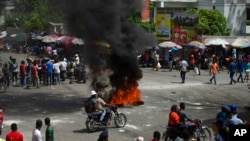At least 89 people have been killed in a week in clashes between gangs in Port-au-Prince, Haiti's capital, where prices are soaring and fuel shortages are getting worse, threatening crucial humanitarian aid for residents.
“At least 89 people were murdered, and 16 others are missing,” the National Network for the Defense of Human Rights said in a statement, adding that the partial assessment of this violence also reports “74 wounded by gunshot or 'white weapon.’"
Since Thursday, bursts of automatic weapons can be heard all day in Cité Soleil, the most disadvantaged and densely populated part of the metropolitan area. Two gang factions clash there, and the police, for lack of men and equipment, do not intervene.
The thousands of families who live there have no choice but to hide in their homes, unable to get water and food.
Some residents are victims of stray bullets inside their modest sheet-metal homes, but ambulances are not allowed into the area to help the injured.
“We call on all the belligerents to allow the passage of relief to Brooklyn (the name of the district of Cité Soleil where the violence is concentrated) and to spare the civilians,” Mumuza Muhindo, head of mission of Doctors without Borders, urged Wednesday.
‘Battlefield’
While it is hampered in its ability to evacuate victims, the humanitarian organization has managed to operate on about 15 injured people per day on average since Friday, in its hospital near Cité Soleil.
"Along the only road to Brooklyn, we encountered rotting or burnt corpses," Mumuza Muhindo said. "It may be people killed in the clashes or trying to flee and who have been shot. It's a real battlefield."
These deadly clashes affect activities throughout the capital because Cité Soleil is where the oil terminal that supplies Port-au-Prince and all of northern Haiti is located.
Throughout the capital, service stations no longer distribute fuel, prices have risen drastically on the black market.
Angry at this situation, motorcycle taxi drivers erected barricades on Wednesday across the main roads of Port-au-Prince, making only short trips by motorcycle within the neighborhoods were possible, AFP journalists reported.
Residents of the capital, who are already at risk of kidnapping, struggle to go about their daily activities.
For more than two years, gangs have operated with impunity, kidnapping people of all socio-economic origins and all nationalities.
At least 155 kidnappings were committed in June, up from 118 in May, according to the Center for Analysis and Research in Human Rights, in its latest report released Wednesday.
Exile in the face of kidnappings
If they can, Haitians flee to the Dominican Republic or the United States. If they don’t have the money or the visa, they risk their lives by boarding makeshift boats, hoping to reach Florida.
Many end up on the Cuban or Bahamian coasts or are stopped at sea by the American Coast Guard.
More than 1,200 irregular migrants were returned to Haiti in the month of June, according to statistics from the National Migration Office.
Faced with the consequences of the war in Ukraine on the world economy, the inflation rate in Haiti, now about 20%, could exceed 30% by the end of the year, economists say.
"We are seeing a significant increase in hunger in the capital and in the south of the country, with Port-au-Prince being the hardest hit," said Jean-Martin Bauer, director of the World Food Program (WFP) on Tuesday.
To avoid the outlying areas of Port-au-Prince and the gangs that operate there, the U.N. agency uses air and sea routes to send aid to the south and north of the country.
Nearly half of the 11 million Haitians suffer from food insecurity, including 1.3 million who are facing a humanitarian emergency close to famine, according to the WFP.




